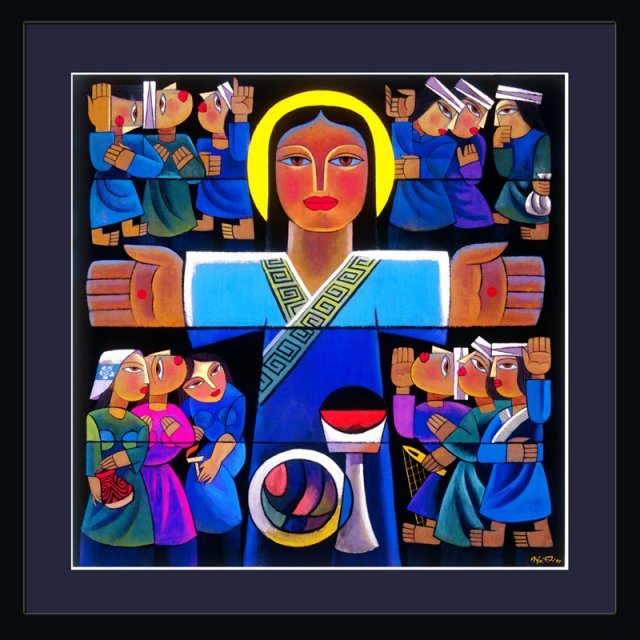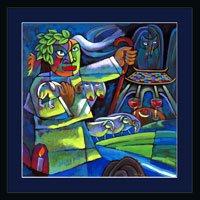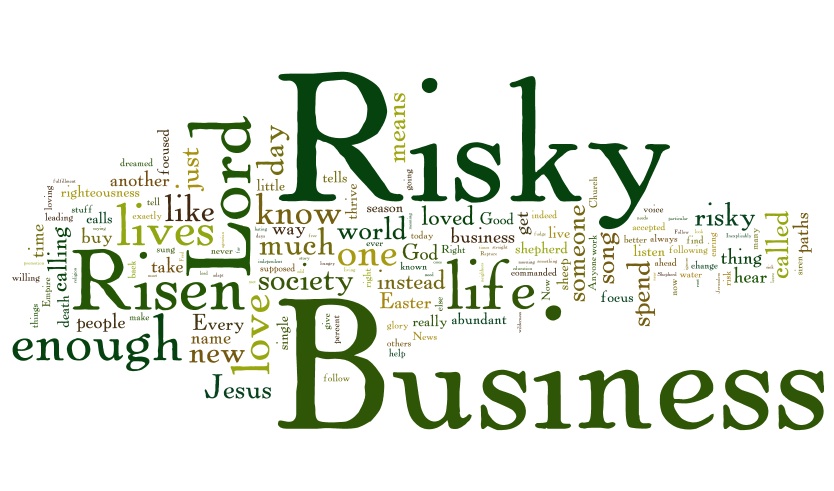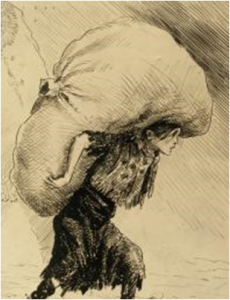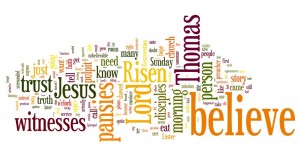Luke 24:36b-38
Jesus doesn’t pull any punches, does he?
Here the disciples are, deep in shock and mourning because their Teacher, their Lord, the man they thought was their Savior, is dead … and two of their group are telling them this fantastical story about how they met the Risen Lord on the road to Emmaus, and boom! There’s Jesus … right … in … front … of … them!
Good Lord, they thought they were seeing a ghost!
How can this be?!
They saw (although from a distance) Jesus die on the cross!
They saw (again, from a distance) Jesus’ body laid in a tomb!
They’ve been in hiding for three days – three days! – because they know the Romans are really good at rounding up “known associates” and hanging them on crosses, too – just to teach the rabble a little lesson, don’t you know …
And, boom!
There’s Jesus, standing right in front of them!
And how does he comfort them?
But telling them, in essence: Your turn!
You are the witnesses, he says, to all these extraordinary things that happened when I was with you.
And you are the witnesses to the fact that here I am with you now, raised from the dead.
I’m not a ghost, he says, not a dream.
I am risen!
And now it’s your turn …
So go on. Get out of here. Go tell the story.
You.
And you.
And you.
You are the witnesses.
And I, the Risen Lord, am counting on you.
• • •
I am confident this is not what the disciples wanted to hear.
When you get right down to it, they have never been the ones to do all the work, have they?
After all, Jesus performed the miracles.
Jesus preached.
Jesus taught.
Jesus healed.
And now he’s telling them it’s their turn?
Their turn to tell the story, to witness to all they had seen and heard and learned and experienced?
Their turn to perform miracles?
Their turn to preach?
To teach?
To heal?
Them?!?!?
• • •
For us sitting here, 2,000 years after the fact, this sounds like a no-brainer, I know.
It’s easy for us to say, “Yeah, c’mon, disciples, go do your job! Go tell the story!”
And it’s just as easy for us to say, “Well, we know they did, because if they hadn’t, we wouldn’t be sitting here today. So good job, disciples!”
It is easy for us to say all that, and to sit back with a bit of satisfaction and perhaps even some smugness.
“Yep, those disciples. Didn’t get it at first, but man, when the Risen Lord challenged them, they finally got it, finally did what Jesus told them to do. A bit slow out of the blocks at first, but after that, yep, they did a good job, don’t you think?”
And then, of course, we can walk away from all that.
Because the job is done, right?
It’s over with, right?
My friends, the good news is that indeed, the disciples did get over their shock, they did tell the story, and as a result, we are here today.
Sounds like the end of the story, doesn’t it?
Alas, I am here today to tell you:
No it is not the end of the story.
It’s just the beginning.
As Winston Churchill said at the end of the Battle of Britain, “This is not the end. It is not even the beginning of the end. But it is the end of the beginning.”
And at the end of the beginning, it is now our turn.
Our turn to be the witnesses.
Our turn to tell the story.
Our turn to perform the miracles – to feed the hungry, give water to the thirsty, proclaim the good news that God indeed does love us … to make the blind see and the deaf hear and the lame walk and the mute sing with joy!
Our turn to teach and preach and tell the story.
Make no mistake, my friends.
The Risen Lord is not just talking to the disciples 2,000 years ago.
He is talking … to us.
Because we are the witnesses.
Now I know that a lot of people these days – perhaps even some of us sitting right here today – are not interested in preaching and teaching about the Good News of God in Christ Jesus. We are not interested in going throughout the world and proclaiming, “Alleluia! Christ is risen! The Lord is risen indeed!”
Not outside the doors of this church, at any rate.
But we really do not have a choice in this, do we?
Because Jesus, because the Risen Lord, the one we are here celebrating this very day, has given us our marching orders.
He is saying to us, right here, right now:
You are my witnesses.
So go on … go tell the story!
You.
And you.
And you!
• • •
Let’s do a little experiment.
Let’s figure out a way for you … for each of you … for each of us … to tell the story.
(Warning Number One: This is a little lesson in evangelism, which is part of mission, which is the very reason for which God created us. As Jesus said, “What are you afraid of?” It’s just a little evangelism …)
(Warning Number Two: I’ll tell you about that in a minute.)
Do you see these flowers here?
Cute little things, aren’t they?
Harbingers of spring …
You see them all the time, all over the place.
Hardy little buggers, aren’t they?
I bet you did not know that in addition to being pretty, you can eat them.
Yes, you can.
You can pull the flowers right off the stem and eat them.
Mmmm, mmmm, good, as the commercial says.
(eat … eat … eat)
(Warning Number Two revisited: Before you go outside and starting pulling up flowers to eat, know this: You can’t eat most of them. Make sure you’re eating pansies, OK? Nothing else …)[1]
Now … if one of you were to call someone who is not at church today to witness the preacher standing in the pulpit eating pansies and told that someone that the preacher indeed did stand in the pulpit and eat pansies … do you think that person would believe you?
Most likely not.
I’m fairly certain this is not happening in a lot of churches this morning.
So if one of you were to call that one person and tell that person about what I’m doing, that person most likely would think you were doing nothing but telling a fantastical story.
You might even scare that person (who would be wondering, I assure you, not about me, but about you and your sanity).
Now, what if two of you were to tell the same story to the same person?
Do you think that person might believe two of you?
No?
Well, what if say, 10 of you were to tell the story … the exact … same … story?
That person might … or might not … believe you.
But … what if everyday here were to call that one person who is not here, and told the exact same story?
Would that person believe you then?
And what if all of you were to tell everyone you met … today, tomorrow, Tuesday, Wednesday … that your preacher stood in the pulpit and ate pansies?
Wouldn’t that be a great story to tell?
Wouldn’t that be a whole lot easier story to tell than just walking up to a friend (or heaven forfend, a stranger) and saying, “Listen, let me tell you about Jesus Christ, the Risen Lord”?
Wouldn’t you rather go up to a friend, or heaven forfend, a stranger, and say, “You’re never gonna believe what happened in church this morning? The preacher stood in the pulpit and ate pansies”? Doesn’t that make for a much easier story to tell?
Because then folks are going to ask you, “Where do you go to church?” And you can answer, “I go to St. Martin’s … you know, over on Jamestown road … right near the place that serves breakfast, lunch and antiques.”
And doesn’t it then give you the opening to tell the rest of the story?
I’m telling you:
Jesus doesn’t pull any punches.
The Risen Lord is standing right here in our midst, and telling us, in no uncertain terms:
You are my witnesses.
So go!
Go tell the story!
If that makes you nervous, fear not.
You can start by telling them about pansies in the pulpit first.
Heck, if you want, you can even eat some pansies yourself.
I guarantee you, people will listen.
So remember:
It’s our turn.
We are the witnesses.
And we’ve got one heck of a great story to tell.
Amen.
Sermon preached on the Third Sunday of Easter, 22 April 2012, Year B, at St. Martin’s Episcopal Church, Williamsburg, Va.
[1] Yes, you can eat other flowers. I know this. But for the purposes of talking to folks in the pew in church, the warning is simple: If it’s not a pansy, do not eat it!
